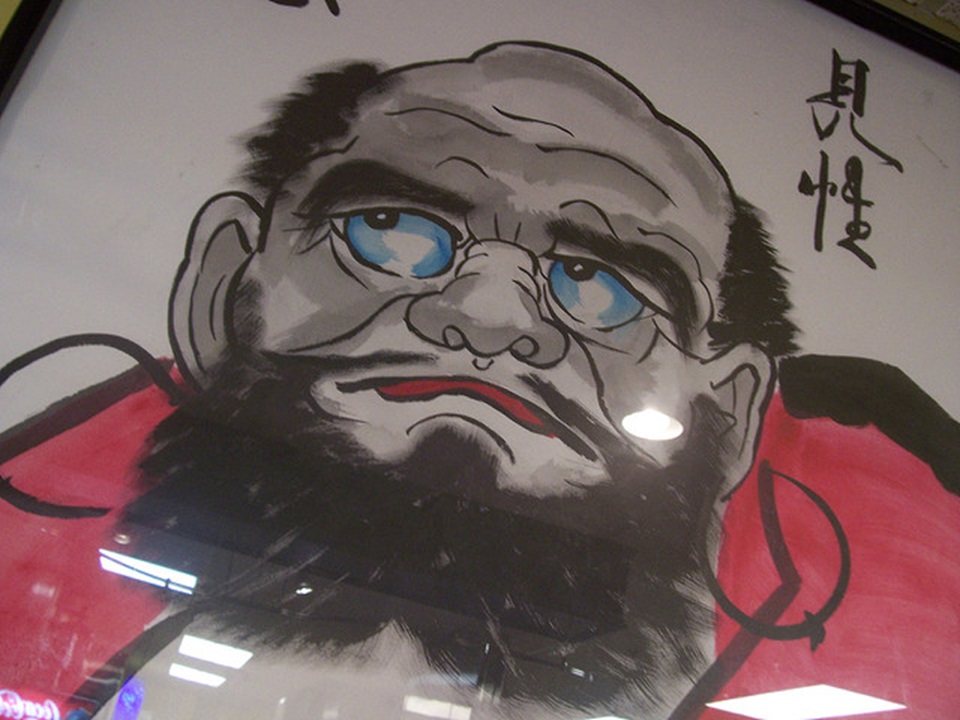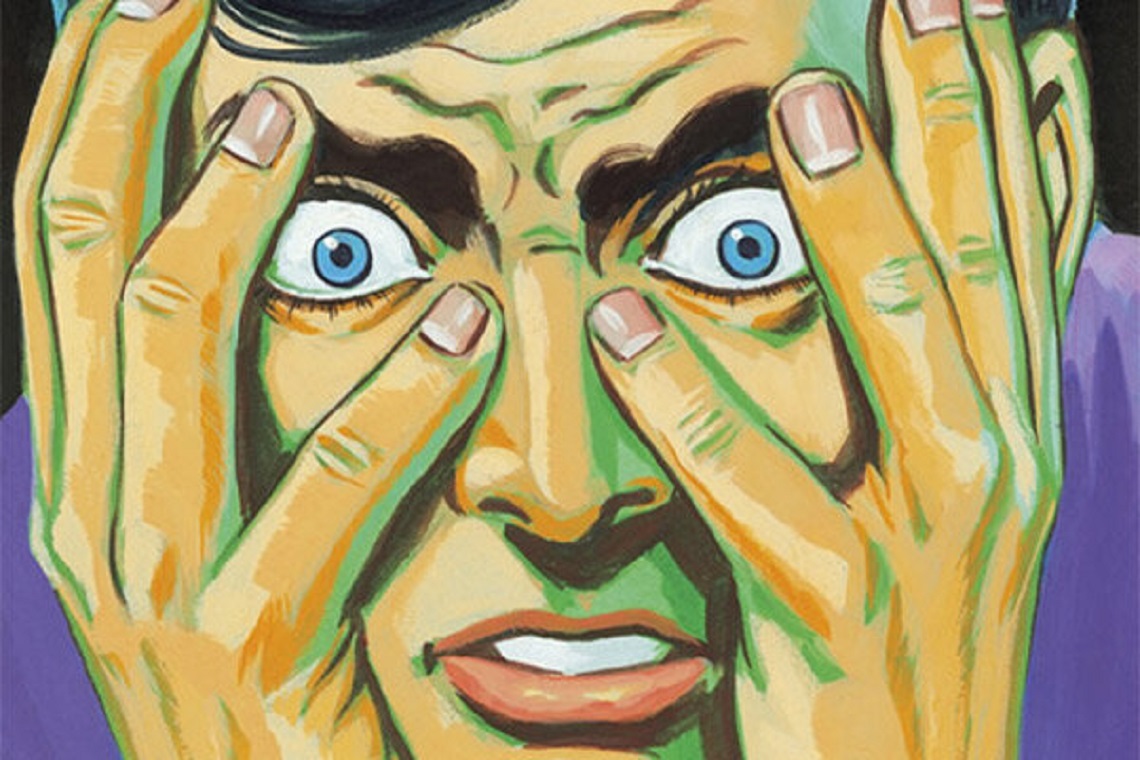For the self that was created by the system of thought, nothing new ever happens. For this self nothing ever changes – it has nothing to look forward to except ‘more of the same’. As if it had not had more than enough of that already…
The reason for this unhappy state of affairs is because the conditioned self itself never changes, and so nothing changes for it. It doesn’t want to change – after all, if it changed then by definition it would no longer be itself. “You don’t look like yourself!” your friend tells you, clearly concerned. But how can ‘you’ not be yourself? That doesn’t make any sense. No matter what you do, it is you doing it, and no matter where you go, it is you going there.
As Abraham Maslow says, our basic default motivation is ‘fear of novelty’. What the self fears above all else is novelty, the radically new. We could also say that the self is the absence of change, that this is how ‘self’ is defined. Nothing new ever happens for the self because it experiences everything from the same unchanging viewpoint and it is that unchanging viewpoint. No matter what happens the self always sees it in its own way, everything is always related to its own fixed perspective. As the Indian saying goes, if you are wearing shoes then no matter where you walk you will never step anywhere but on the soles of your own shoes. So for you the whole world is no bigger that the soles of your shoes! The world is endlessly expansive but our understanding of it is resolutely narrow; there are many possibilities in the world but we restrict ourselves to the ones we already know about…
Whenever things start to feel strange then that is a sure sign that I have shifted a bit from my own habitual viewpoint. For whatever reason, I have forgotten to put my shoes on when I got out of bed that morning. As soon as this happens I feel uncomfortable, I start to feel homesick for my old way of seeing the world, homesick for my old self, and so I run back to my bed and put my shoes on straightaway. I don’t – as a conditioned being – have that kind of curiosity. I am curious about the world only insofar as the integrity or validity of my habitual viewpoint is not being threatened and this of course means that I am not curious at all. Lacking curiosity, I restrict myself to a world that is only superficially interesting, a world in which there are never going to be any real challenges to the all-important status quo.
The predicament of the conditioned self is this: it fears and shuns novelty at any cost but the inevitable result of this rejection of the genuinely new is that its situation is going to be quintessentially stagnant, quintessentially sterile. As a conditioned being I fear the genuinely new above all else, but by closing myself off to the new I trap myself in a world of bland and tedious superficialities. By default, I commit myself to the frighteningly sterile situation in which nothing new ever happens.
So how does the conditioned self survive? How does it cope with the dreadful sterility of its situation? The answer to this question is of course that it copes by becoming skilled at entertaining itself, by becoming an expert at time-wasting; it copes by becoming ‘a master of self-distraction’. But this is tricky sort of a thing – if I know that I am only entertaining myself then this is not entertainment. If I know that I am deliberately performing ‘time-wasting’ routines then this knowledge makes what I am doing unbearably tedious. If I know that I am distracting myself, then I am no longer distracted.
The way around this snag is obvious – once I spot it. The answer to the predicament I am in is for me to set up some device that will do the job for me; I set up an agency that will generate non-stop distractions for me. And then I can take all the dramas, all the issues, all the tasks that are thrown my way perfectly seriously – I can take them all seriously because they were not invented by myself. All of these empty dramas and issues and tasks are now very serious indeed because they are ‘officially sanctioned’ and so I am duty-bound to do my very best to sort them out. I can’t pull out of them even if I want to – after all, that is the whole point of the exercise. I have after all deliberately set the system up precisely so that I no longer have any choice in the matter!
This ‘system’ can of course be understood as society, but on a deeper level it is the system of thought, the logical mind which is responsible for creating all of the structures in our lives. The rational mind is the entertainment device, the time-wasting circuit, the game-creator, the distraction machine. It is the Hotel California.
So the system assists me in a spectacularly efficient fashion from seeing that when I am trapped in the system nothing new can ever happen. It does this job so very well that I could easily live my whole life without ever consciously confronting this dismal fact. So I am very safe, very institutionalized, and it is because I am so institutionalized that I am so afraid of change. This is the classic effect of institutionalization – the conditioned inability to depart from the established pattern. The trap that I am in is a circular trap – I resort to the institution of the system because I am terrified of anything new, but it is the effect of being institutionalized that is keeping me so afraid, so dependent, so lacking in curiosity. The system is like heroin – it is both the cause of the problem and the cure for it. It both creates my addiction, and services it.
The real ‘catch’ in all of this is that when the system entertains or distracts us, it doesn’t just do this in a straightforward way like an adult amusing a small child by pulling faces or doing simple conjuring tricks. It entertains and distracts us by getting right inside our heads and changing the way we see the world. It doesn’t just entertain us, it conditions us. It formats our consciousness. It doesn’t just provide us with the things that we want, the images that we find attractive, it conditions us to want those things, to like those images, in the first place. It implants the specific needs and desires in us that make us interested in what it has to offer. It gives us the dreaded itch and then offers to sell us something to scratch it with.
The conditioned self is the self that has been formatted by the system to respond to all the incentives and disincentives that it has up its sleeve – I am the heroin addict and it has all the heroin. In a very real sense then, we can say the system that we have set up to keep us busy all the time so that we never get to see that we are ‘busy doing nothing’ doesn’t just create the compulsively distracting environment that we live in – it also creates the image of ourselves that we have as a result of living in that environment. It defines both the game and the game-player, and anything that isn’t defined on its terms doesn’t get to exist.
The desire is no different from what is being desired, the one is the projection of the other. After all, if I wasn’t feeling desire for the object in question then it wouldn’t look the same way to me at all. It wouldn’t have that seductive glitter to it, it wouldn’t be shining out at me in the way that it does. Whatever it might be, it is only an ‘object of desire’ to me because I am desirous of it. In a nutshell, the object in question corresponds to a specific deficit or lack that I have within me and its value to me is a direct measure of the pain or hunger that this deficit is causing me.
This is all therefore just another way of talking about addiction – an addict is always going to be very interested indeed in the commodity that is going to put a stop to the particular itch that is tormenting him. He isn’t interested in anything else because nothing else will satisfy that specific itch, that specific hunger. So when we talk about the system effectively distracting us, what we mean is that it grabs hold of our attention by parading images in front of us that correspond to the specific ‘lacks’ that have been built into us. These ‘lacks’ or ‘needs’ are what render us ‘distractible’. This provides the basis of what Abraham Maslow calls a deficit-driven (or D-Type) motivation and it is this ‘D-motivation’ that ensures we are buzzing around the place like blue-arsed flies the whole time trying to make good our inner deficits! ‘Conditioning’ is therefore just another way of talking about the deficits that have been programmed into us, the deficits we feel that we have, even if in reality we don’t.
The unconditioned self would be no good at all from the point of view of ‘ease of distractibility’ because it has no deficits that need to be made good, no deficits that need to be continually compensated for. It is already complete in itself, autonomous, whole. It is not missing something that needs to be ‘made up’ (or ‘completed’) by the system. According to Maslow this self operates on the basis of B-motivation – I act out of my being rather than out of my lack of being, I act out of my ‘presence’ rather than my ‘absence’. I act out of love rather than out of need. The unconditioned self does not need to be distracted because it doesn’t have an aching hollowness right at its very core. As the unconditioned being that I really am I have no need at all for a distraction-producing device or agency whose sole purpose is to keep me from having to discover the frightening truth of my own unremitting sterility, my own painful ‘nonentity’.
Saying that the deficit-driven, hunger-tormented conditioned self is wholly defined by the system is just another way of saying that the system supplies everything that this hollow self needs in order that it doesn’t feel hollow. This conditioned self is nothing ‘in itself’ and is as a result entirely dependent upon the external agency in order to feel good. It might come across as being supremely confident – arrogant even on occasion – but this is only because it has the system behind it! Just as a man who is not physically powerful in himself can be very confident in a confrontation if he is backed up by the incredible hulk so too the conditioned self is supremely confident when the specific ‘conditions’ (or ‘rules’) that it takes for granted seem unquestionably real to it.
So we might say that the conditioned self is a mass of insecurity covered up by a very thin layer of brashly superficial confidence. Or that it is like a glove puppet which is only animated when it has the hand of the system reaching up its backside. It is the unseen and unsuspected system which supplies the puppet with its back-bone, its substance.
But to say this is misleading because it makes it sound as if the system has some genuine substance of its own, which is not the case. The logical system which has the job of continually distracting us is as we have already said no more than the ‘exteriorized projection of the interior deficit’. To the extent I feel bad, the external token or object that I associate with the ending of this bad feeling looks good and so the inner lack and the attractive image are really the two aspects of the same underlying thing. As long as I remain unaware of the inner deficit that is driving my behaviour I am therefore going to externalize the whole drama and spend all my time either chasing attractive projections or running away from terrifying ones. The whole set-up is thus just an empty wheel that keeps on spinning around and around forever, eternally getting nowhere. The shadow-self has no substance to it and neither does the projections that make up its subjective environment since these attractive or terrifying projections are no more than that self’s desperate denial of its own nonentity, its own unreality.
This brings us to the real crux of the matter: we have said that for the conditioned self – the self that is created by (or ‘defined by’) the system in its own image – nothing new ever happens. This is not quite stating the matter correctly however – it is not that nothing new ever happens to this self but rather that nothing ever happens to it. Period.
Nothing ever happens to this self because it doesn’t actually exist. It isn’t ‘anything’ really because it is an absence not a presence. It is nothing more than a walking, talking deficit – a shadow that imagines itself to be ‘the caster of the shadow’. Inasmuch as the conditioned self is completely defined it has to be a deficit; anything that is completely defined or completely delineated is always going to be an abstraction, an infinitely thin slice (or ‘analogue’) of reality, a dry insubstantial cardboard cut-out (or ‘image’) rather than the genuine article.
This is after all how definitions work – the only way I can get to be ‘non-abstract’ is if I take the risk of allowing myself to remained ‘un-defined’ but this is a risk that I am infinitely reluctant to take. I am infinitely reluctant to take it because I have an intimation of what would happen; on some level I know that if I refrain from defining myself what is going to happen is that I will no longer exist as a separate, isolated ‘self’. This – needless to say – is such a tremendous step into the unknown that I don’t even want to think about it. From my narrow perspective, this would be an unmitigated disaster. But if I did take this tremendous step into the unknown, then instead of continuing be stuck as I usually am in the game of the defined and isolated self or ego I would find myself relaxing back into ‘who I really am’ and ‘who I really am’ is not a defined reality, not a game.
When I definitively or literally state ‘who I am’ (or rather, when the system definitively and literally states ‘who I am’!) then all that I am is a ‘blank tautology which cannot see itself to be a blank tautology’. Rules or definitions work by excluding everything that is not themselves, but because they are so very narrow this process ends up excluding the whole of reality – and this is the impoverishment of abstraction. Defining, like controlling, is how I try to ‘seize hold’ of reality but what I don’t understand is the Principle of Cosmic Irony which says that the more I seize hold, the less I have as a result. When on the other hand I do not state definitely who or what I am (and do not allow the system to do so on my behalf either!) then there is nothing that I am not since I have excluded nothing. In this case I am no longer impoverished, hollow, starved of being, but full – though full of what I cannot say.
So what we are basically saying here is that the conditioned self is something like the ‘negative space’ that is left when I take something away. It is not a ‘thing-in-itself’ but merely a type of hole in the fabric of reality – an absence that mistakenly understands itself to be a presence. It is an absence because it never changes, because it has opted out of reality, which is as Heraclitus says is nothing other than change itself. I can opt out of reality if I want to but the price of this choice is that I ‘flip over’ from the world of light into the world of shadows. I flip over from the world of essence, which is the world of actual content, to the superficial world of empty images, the illusory world of misleading appearances.
This is all to do with our willingness to take risks – the more cautious I am (i.e. the more I am inclined to ‘hold on’ to myself), the less I am. And contrariwise, the more I am able to relinquish myself, ‘let go’ of myself, the more I am. One direction leads to absence, to impoverishment of being, the other to presence, to the infinite enrichment of being.
So if I let go of myself completely, then I am completely present, and yet at the same time there appears to be a loss because the ‘self’ – which is actually no more than my fear-driven ‘holding on’ – no longer exists. Non-existence no longer exists. The absence is now absent, the shadow replaced with the light. And yet the irony is that inasmuch as we identify with the shadow self (the ‘player of the game’, the ‘holder on’) we resist the light as hard as ever we can, we resist it to the bitter end.
We may perhaps sum up all of the above discussion by making one curious observation – the observation that the manufactured self appears to exist but doesn’t, whilst the un-manufactured self appears not to exist, but does…
Image – magazine.artland.com






